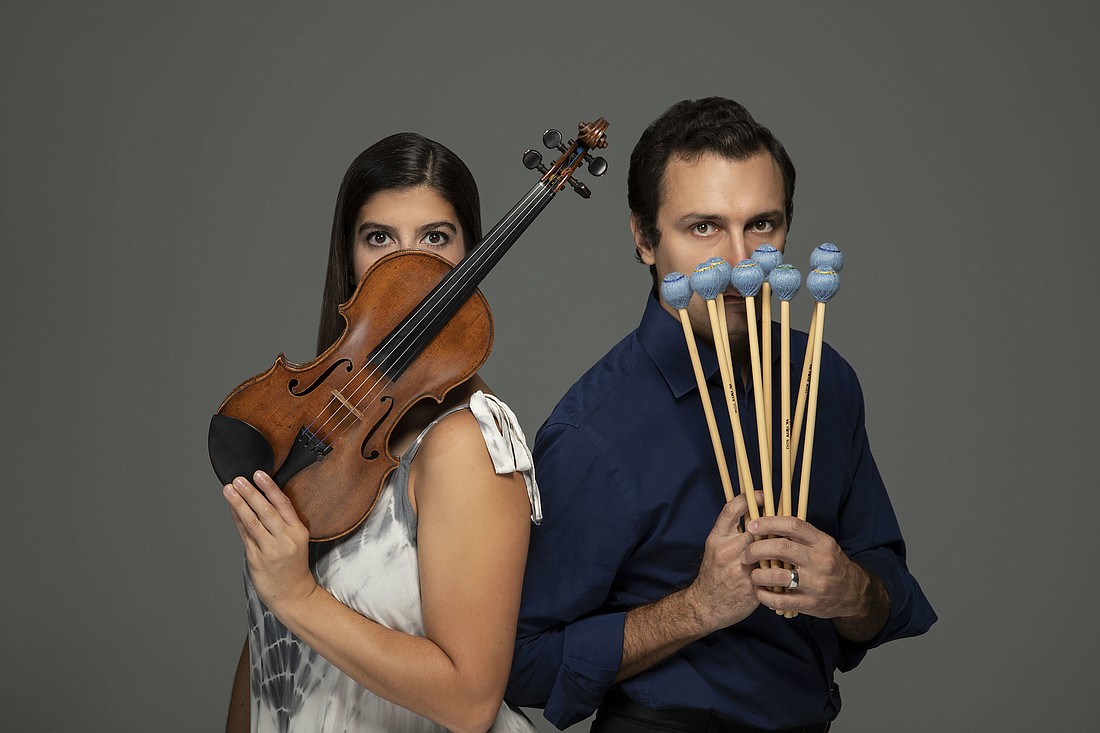- November 22, 2024
-
-
Loading

Loading

“The present day composer refuses to die.”
— Edgard Varèse
Samantha Bennett and George Nickson agree with Varèse. They’re the founders and co-artistic directors of EnsemblenewSRQ, a Sarasota contemporary music collective.
They’ve been committed to fresh, new classical music since they founded the group in 2016. And it’s a commitment based on both knowledge and practice.
Both are principal players in orchestras. Bennett is Sarasota Orchestra’s principal second violin; Nickson is the principal percussionist at the Dallas Symphony and also teaches percussion at Southern Methodist University. This pair draws on that experience in their EnsemblenewSRQ concerts, as well as their occasional concerts for the Sarasota Concert Association and New Music New College.
They see themselves as musical ambassadors. They love their work, though it isn’t easy. The pandemic made it even harder. But it didn’t make them quit.
When most people imagine “classical music,” they imagine dead, white, male composers in powdered wigs. That’s the cliche association. But you prove them wrong.
Nickson: That’s what we’re here for. There is an incredible range of people writing fantastic music right now. The contemporary musical universe is rich and amazingly diverse.
Bennett: We want our audiences to explore the full scope of that expanding universe.
You play great music. “Easy listening,” it’s not. Your compositions can be dissonant or atonal — or from a non-Western musical scale. How do you draw audiences into that?
Nickson: Well, each concert is its own musical journey. We guide the audience along the way. In the same way a museum director curates an art exhibition, we curate the concert experience. We try to show the listeners the connections between different musical forms. What’s the starting point of the style, how it proliferated and cross-pollinated with other styles and how it connects to the composer’s culture.
You don’t throw the listener in the musical deep end.
Bennett: No. We try to share our excitement with what’s happening in the music world right now. That creates a real connection with audiences. This music isn’t remote or from the past, and that’s particularly important in the time of COVID. It speaks to what we’re living through in the 21st century.
Nickson: Exactly. We don’t have to fight to put ourselves in the point of view of an 18th-century composer. Collectively, we have all lived through the same experience.
What’s a short list of contemporary composers you love?
Nickson: That’s constantly changing, but people we performed recently include Nico Muhly, Eric Wubbels, Jessica Meyer and Elizabeth A. Baker.
Bennett: I’d also like to mention Kevin Day, Quinn Mason and Andreia Pinto Correia — she’s a fantastic Portuguese composer. Their works have become part of our repertoire.
How has the pandemic affected your commitment?
Nickson: It prompted us to offer streaming concerts. We originally thought we could return to live performances this spring, but it’s just not feasible.
Bennett: But it also opens up new possibilities. When we planned this season, we had to cut down the repertoire to what we could fit on stage. That forced us to leave out a lot of great compositions. Going virtual allows us to put them back in.
Your streaming concerts are free. Why?
Bennett: We wanted to keep our music accessible during the pandemic. Everyone’s so much more isolated now. People are starved for artistic experiences. We made sure we could reach them.
Has streaming content expanded your base?
Nickson: Yes, it has. People from outside Sarasota — people from all over the country and the world can now see our concerts. Going virtual has increased both the geographical and demographic range.
Bennett: We’re also drawing in lot more young people. That’s something we’ve always wanted.
Your commitment to diversity extends to composers as well. You’re using the pandemic to highlight work by composers who are female, LGBTQ and people of color.
Bennett: Absolutely. These composers have been historically underrepresented. We’ve always championed a very diverse group of composers. That’s been part of our mission since day one. But in light of the social issues of our time, we’re reexamining our work to see if we can be even better.
Your ‘Sun Colors’ streaming concert is coming April 19. What’s one great composition?
Bennett: They’re all great. But if I have to stick with one, I’ll go with “Darshan,” by Reena Esmail, an Indian American composer. She composed this amazing work for solo violinist, and I’m super excited to get to play it. It’s based on “Raag Charukeshi,” a melodious raag centering on a particular scale from Hindustani classical music. It’s a very different experience, and I think audiences will be transported.